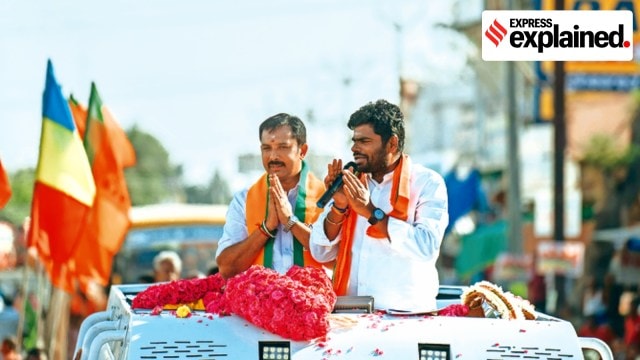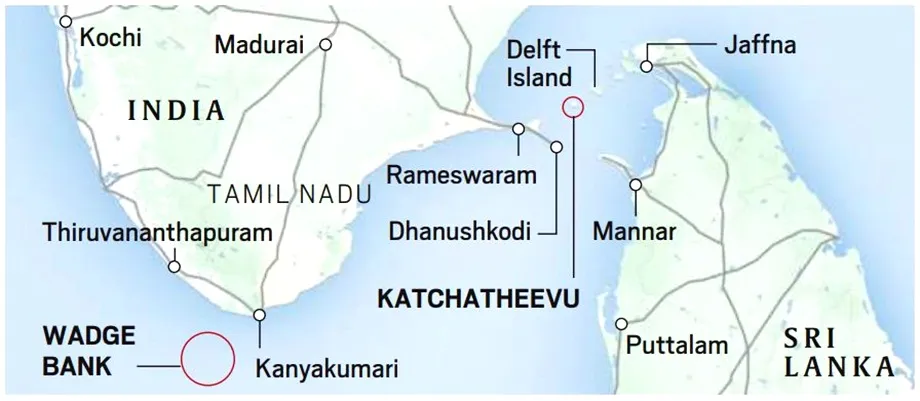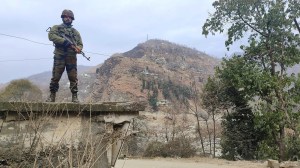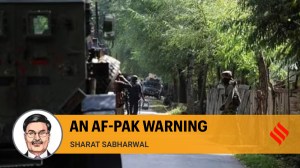- India
- International
Katchatheevu controversy: Why international agreements are best left alone in domestic politics
The Katchatheevu controversy is being viewed as a political brownie-point-scoring exercise by the BJP against the DMK and Congress in Tamil Nadu. But it has sparked disquiet in the strategic community both in New Delhi and Colombo. Here’s why
 Row was triggered by an RTI question by Annamalai (right). X/ @annamalai_k
Row was triggered by an RTI question by Annamalai (right). X/ @annamalai_kAfter Prime Minister Narendra Modi amplified an RTI reply on Katchatheevu obtained by Tamil Nadu BJP leader K Annamalai by accusing Indira Gandhi’s government of “callously giving away” the island to Sri Lanka, External Affairs Minister S Jaishankar reiterated the talking points in the issue — but did not go further.
Asked whether the Indian government intended to “reopen” the 1974 bilateral pact on Katchatheevu, the diplomat-turned politician said the issue was “sub judice” — referring to a petition filed in the Supreme Court by former Tamil Nadu Chief Minister J Jayalalithaa.
While the controversy is being viewed as a political brownie-point-scoring exercise by the BJP against the DMK and Congress in Tamil Nadu, it has sparked disquiet in the strategic community both in New Delhi and Colombo — especially since it has the imprimatur of the Prime Minister himself.
 Katchatheevu map.
Katchatheevu map.
Basis of international pacts
When two governments negotiate an agreement, they work with information and understanding of the issue available at the time. In making the best possible decision, governments also take into account possible future scenarios and projections. States are rational actors, and they carry out clear-eyed cost-benefit analyses before deciding whether any deal is worth doing.
Veteran diplomats and negotiators say that there is always a compromise, a bit of give-and-take, in the negotiations. An agreement on what and what not to concede is critical — current negotiations on the India-UK Free Trade Agreement are moving slowly because the two sides have not been able to agree yet on the specific give-and-take that will make the deal worth doing for both.

What makes a good deal?
State parties are expected to abide by the agreements they sign. The fundamental principle of any good deal is that it stands the test of time. If it doesn’t, there is a case for looking at it afresh. If it does, there is no reason to revoke or pull out of a deal.
Many of the international agreements that India has signed with its neighbours have helped to maintain peace and mutual cooperation in the region, irrespective of the government or party in power. A recent and pertinent example is that of the boundary agreements between India and Bangladesh.
The 2015 land boundary agreement was ready when the Congress-led UPA was in power. The BJP — which was in the opposition at that time — had opposed it, but after Narendra Modi became Prime Minister in 2014, the party changed its position.
The pact involved an exchange of enclaves located in each other’s territories, which had made life for the local population difficult for more than 40 years. When the two governments decided to regularise the enclaves on an ‘as-is-where-is’ basis, India lost some territory in the net analysis. The opposition Congress, which had negotiated the deal and understood its benefits, did not make an issue of the ‘loss of territory’, and did not criticise the pact.
India also settled its maritime boundary with Bangladesh in July 2014, soon after the NDA government came to power. New Delhi, which lost at the Permanent Court of Arbitration at The Hague, accepted the verdict and moved on.
These decisions were taken in view of broader national interests and strategic ties with Bangladesh, which has paid dividends as the government of Prime Minister Sheikh Hasina has cracked down on anti-India terrorism in her country, and remained a steadfast friend of India.
Cost of unilateral action
Any unilateral reopening of agreements or reviewing of pacts puts a question mark on India’s international credibility, especially if the agreements in question have stood the test of time.
Austin Fernando, a former Sri Lankan High Commissioner to India, told The Indian Express that the BJP’s attempts to reignite the Katchatheevu issue might be a “vote-puller” ahead of elections, but it would be difficult for the Indian government to step back afterward, which was a “problem”.
“It seems that this is only rhetoric for the election. But once they have said something like this, it is difficult for the government to get out of it after the elections, because BJP will win. It is the problem. They and we both should think about it,” Fernando said.
Apart from setting a precedent that might encourage future governments to look at reviewing old pacts with neighbours and partners based only on narrow political convenience, there is also the question of India’s bilateral ties with countries, and of New Delhi’s international image.
Thus, while India’s call for a review and modification of the 1960 Indus Waters Treaty with Pakistan has been acceptable in view of the history of war and disputes with that country, the case of Sri Lanka, a small and friendly neighbour, is different.
Given India’s size, population, and economic and military might, unilateral provocations might spook smaller countries, and lead them to view New Delhi as an overbearing regional bully — an image that is unlikely to bring India many diplomatic gains. The new pro-China government of the Maldives has been portraying India precisely in this manner, and there are already smaller “India Out” movements in Bangladesh and Mauritius as well.
There are also consequences for India’s credibility with its global partners, and adherence to the rules-based order. This is not the ideal image for an aspiring global power, which wants a seat at global high tables, including at the UN and other international organisations.
It has taken a lot of hard work over decades to build India’s reputation as a responsible power. Despite not signing the NPT, New Delhi’s exemplary track record at nuclear non-proliferation earned it the exemption at the Nuclear Suppliers’ Group in 2008. The Indo-US nuclear deal, and other similar deals followed. The end of the technology denial regime was the fruit of India’s responsible behaviour.
On the other hand, President Donald Trump damaged America’s reputation by walking out of the Paris Accord on climate change and the JCPOA nuclear deal between Iran and the P5+1 countries on which his predecessor had worked with international partners. And China’s track record of breaking pacts — including with India on the Line of Actual Control — has raised serious questions about its commitment to the global rules-based order.
Sri Lanka has so far been extremely mature in its response to statements in India about Katchatheevu. Foreign Minister Ali Sabry has said that the issue was settled 50 years ago, and there was no need to revisit it. “There is no controversy. They (India) are having an internal political debate about who is responsible. Other than that, no one is talking about claiming Katchatheevu,” Sabry said.
Provocative claims by the BJP could cost India some of the goodwill it has earned after assisting the people of Sri Lanka with $4 billion during the country’s economic crisis, and helping Colombo secure a bailout package from the IMF. India should also be wary of Beijing seeking to take advantage of any potential rough edges that develop in bilateral relations.
More Explained
EXPRESS OPINION
Apr 05: Latest News
- 01
- 02
- 03
- 04
- 05































